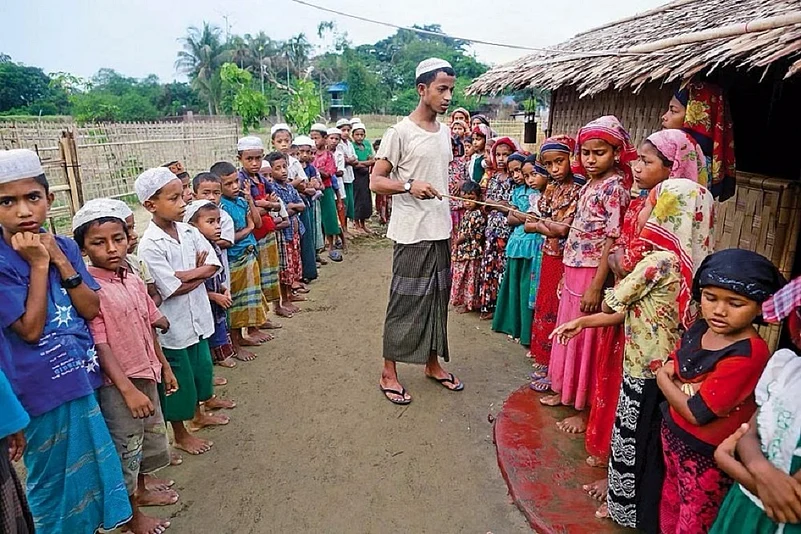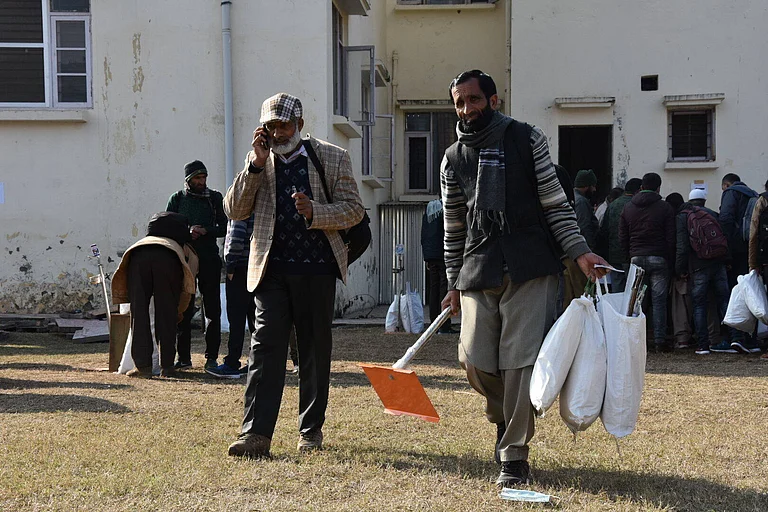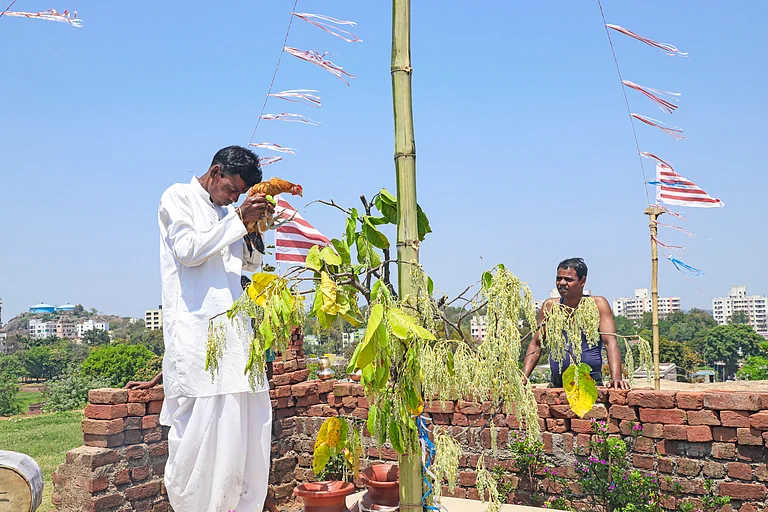It is unusual of any business body to give a call to “identify and kill” that trigger communal violence and slow down business activities. But unmindful of the consequences, Jammu Chambers of Commerce and Industries (CCI), have coined a new slogan and it is being described as “identify and kill movement.” The target of the movement will be 5743 Rohingyas Muslims.
The Rohingyas are put up in Samba and Jammu districts of Jammu region of the state and the CCI has given the government one month’s time to free Jammu of Rohingyas, whom they call criminals and drug traffickers.
Spearheading the movement in Jammu is CCI president Rakesh Gupta. Gupta on April 7 startled his counterparts in the Valley and others when he said if the government failed to deport the Rohingya settlers within 30 days and didn’t book people on whose land they have settled, the Chamber will launch a movement on its own.
He said the CCI will have no option but to launch “identify and kill movement against such criminals.” Gupta says the CCI was the first to demand their deportation from the State as the Chamber is committed to protect the interests of the people as a part of “social corporate responsibility.”
His logic: “It shall be no offence to deal with such criminals and drug traffickers, who have illegally crossed into the State of J&K. It is high time the people shared the responsibility of the security forces and dealt with them as the situation demands.”
Incidentally, all of sudden, Gupta and others, who favour this movement, have become votaries of the Article 370, which guarantees special status to Jammu and Kashmir.
“It may not be out of place to mention that neither the Government of Jammu and Kashmir is signatory to any United Nation’s treaty nor Article 370 allows illegal foreign settlers for any permanent settlement in the State,” Gupta said.
The next day after the Chamber threat, several civil society groups of Jammu and political parties, took out a rally calling the Rohingyas a big danger. The marchers included lawyers, Panun Kashmir, an amalgam of Kashmiri pundits groups; Rotary Club and even Morning Walkers Association to name a few -- reflecting the depth of resentment against Rohingyas.
As outrage poured on social media, particularly in the Valley, against calling the “identify and kill” movement, the government stepped in and said no one would be allowed to take law in their own hands.
Under pressure, the CCI too grotesquely tried to explain off. It said: “identify and kill movement” was meant to identify the foreign settlers and take effective measures to kill the issue.”
The statement has unnerved many people especially those from the Valley and other Muslim dominated area of the State, who have migrated to Jammu finding it safe and peaceful. Apart from Kashmiri pundits, a large section of prominent workers of pro-India political parties, especially the National Conference, the Congress and the Peoples Democratic Party (PDP), police officials, have over the years migrated to Jammu from the Valley to live peacefully and safely, at least for six months during the winter.
As uprising and unrest has become part of daily Kashmiri living, a section of Kashmiri Muslims have purchased land in Jammu and settled in the winter capital. During the unrest of 2016, a large section of Kashmiri students migrated to Jammu to pursue education in peaceful environment. That is the reason Chief Minister, Mehbooba Mufti, praised Jammu people and described the place as hub of Kashmiriyat, a syncretic culture of living together. She said the culture for which Kashmir was famous for, was now seen in Jammu only.
But for independent legislator like Engineer Rashid, who has filed complaint against the CCI for announcing the launch of “identify and kill movement”, current situation in Jammu is scary.
He said various parties in Jammu are competing against each other to throw Rohingyas out.
“In Jammu discussion is all about Rohingyas.”
The anger is basically not against Rohingyas, he said. “It is a reflection of the anti-Muslim sentiment and it is being channelized through Rohingyas”, he warned.
Rashid argues that if the presence of non-state subjects is of so much concern to the CCI, why are they not demanding expulsion of the West Pakistan refugees?
“Why are they silent over those thousands living in temporary shelters in Kashmir region and why they are not talking those thousands of families from Punjab and other States illegally settled in Jammu? First they will target Rohingyas and then other Muslims if the State remains mute spectator,” Rashid said.
Jammu-based Panthers Party leader and former Education Minister Harsh Dev Singh said Rohingyas are illegal immigrants unlike the West Pakistani Refugees.
“The West Pakistani refugees are citizens of the country. The two cannot be clubbed together”, he said.
According to Singh, concern in Jammu is over the settling of illegal immigrants. He said the government had given their figures previously in the Assembly as there are around 18 FIRs registered against them and 38 cases of illegal border crossing. “Once you have identified them, why don’t you deport them”, he said. “They are involved in human trafficking and drug trafficking and are posing serious threat to Jammu’s harmony”, he said.
In November last year, the Valley separatists and political parties rose against the government for granting native certificate to the West Pakistani Refugees, alleging that the move is aimed at changing demography of the state.
Unlike 36,384 refugee families from Pakistan-occupied Kashmir (PoK), who have been granted permanent citizenship of the state, the West Pakistan refugees (WPR) are not given any citizenship by the successive state governments. However, they are citizens of India and vote in the parliamentary elections but they are not allowed to vote in the elections to the state Assembly.
A government committee, known as the GD Wadhwa committee, in 2007, had reported their number as 47,215 in 1947. The committee, set up by the state government to look into the refugees’ grievances and demands, however didn’t come up with their current population figures. The successive governments have refused to cover them under the category of permanent residents citing Section 6 of the J&K Constitution, based on the state subject notifications issued by Maharaja Hari Singh in 1927 and 1932.
According to Zafar Choudhary, an author and well-known Jammu based journalist, the Rohingya issue cropped up after the separatists and the opposition parties, including National Conference, voiced concern over the grant of nativity certificates to the West Pakistani Refugees.
“Since all WPRs are Hindus and all Rohingyas Muslims, a binary was sought to be drawn. It appealed to some sections, which have galvanized people convincing them that Rohingyas are threat.”
Rohingyas, according to Choudhary, are in Jammu since 1970s. “The International border (IB) between Akhnoor and Hiranagar has been always famous smuggling bulge. This has been used by Bangladeshi to cross over to Pakistan and then further to Europe. Rohingyas also followed. Some managed to cross over, some got stuck up and some stayed,” he said.
Choudhary says the issue is not how they reached Jammu but it should be how they arrived in India.
“India had accepted Burmese refugees and offered them amenities under various international commitments and thus Rohingyas living in Delhi, Haryana and Jammu enjoyed some protection including access to healthcare.”
As the men provide cheap labour and women domestic help, they have sustained their livelihood though language has remained the barrier. But now the situation is changing as the administration in Jammu is taking away amenities like electricity.
Prof. Hari Om, who was earlier with the BJP and now formed his own Jammu For India party, sees Kashmiri hands in bringing Rohingyas to Jammu. “They were brought to Jammu after some Kashmiris in the West Bengal informed them in 2010 it was a safe place being Muslim majority and the government is secretive about their number. It is 30,000 not 5000 something as projected by the government.”
He said unlike Muslims of Rajouri, Poonch and the Valley who have settled in Jammu, Rohingyas were foreigners and could change demography of Jammu.
“If the government is for implementing the Article 370, implement it in toto or abrogate it. Predominant view here in Jammu is that if Valley leaders like Omar Abdullah and separatist support them, it is conspiracy against Jammu and aimed."
With the cry over presence the Rohingyas getting shriller in Jammu, Chief Minister Mehbooba Mufti led government’s next step will be watched carefully.


























